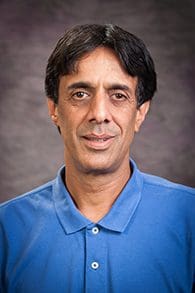MANHATTAN — Bharat Ratra, university distinguished professor of physics in the College of Arts and Sciences at Kansas State University, has been named a 2023 fellow of the American Astronomical Society.
Ratra is one of 22 American Astronomical Society Fellows being honored this year for original research and publications, innovative contributions to astronomical techniques or instrumentation, significant contributions to education and public outreach, and noteworthy service to astronomy and the society.
Established in 1899, the American Astronomical Society is a major international organization of approximately 8,000 professional astronomers, astronomy educators and amateur astronomers. Its mission is to enhance and share humanity’s scientific understanding of the universe as a diverse and inclusive astronomical community.
The society is recognizing Ratra for his pioneering research in cosmology and particle astrophysics leading to the development of dynamical dark energy models and for sustained commitments to science education, undergraduate research and science popularization at all levels.
Ratra studies the structure and evolution of the universe. He currently focuses on developing models for the large-scale matter and radiation distributions in the universe and testing these models by comparing predictions to observational data.
According to Ratra, he and Jim Peebles, Emeritus Albert Einstein Professor of Science and emeritus professor of physics at Princeton University, proposed the first dynamical dark energy model in 1988. Peebles received a Nobel Prize in Physics in 2019.
“Dark energy is the leading candidate for the mechanism responsible for causing cosmological expansion to accelerate,” said Ratra. “The discovery that cosmological expansion is accelerating is one of the most significant scientific discoveries of the last quarter of a century.”
Ratra has published more than 140 scholarly papers and has been cited more than 18,000 times. He has mentored 13 graduate students, five postdoctoral fellows and three visiting faculty members. In the past five years, he has given more than 100 invited presentations around the world.
“Dr. Ratra has had an amazingly versatile career as one of the inventors of dark energy and as a dogged analyst who has tested his models of cosmologies against many different data sets,” said Tim Bolton, physics department head at Kansas State University. “He has mentored numerous students from around the world and is one of K-State’s best science communicators, explaining big, complicated ideas in a clear and understandable way.”
Ratra has received more than $10 million in individual and collaborative grants, largely from the U.S. Department of Energy and the National Science Foundation. He has received many national and university honors and is a fellow of the American Physical Society and the American Association for the Advancement of Science.
He is also active with many science outreach endeavors, including the National Science Foundation’s QuarkNet program for high school science teachers and collaborations with several local schools.
Ratra joined K-State’s physics department as an assistant professor in 1996. Before that, he was a postdoctoral fellow at Princeton University and both the California and Massachusetts Institutes of Technology. He has a doctorate in physics from Stanford University and a master’s degree from the Indian Institute of Technology in New Delhi.













